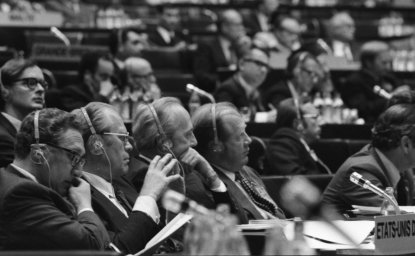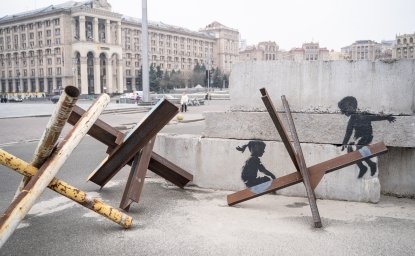A Tragic Feud: Alienation Between the Russian State and the Liberal Intelligentsia, Past and Present

"If you exclude an intelligentsia from responsibility, an intelligentsia will become irresponsible," stated Anatol Lieven, senior research fellow, New America Foundation at a 4 June 2007 Kennan Institute talk. Lieven said this "vicious cycle" of alienation has been a recurrent feature of Russian history, which has seen a consistent rift between those responsible for running the state and those intellectuals who have wanted to see Russia move rapidly in a Western direction. According to him, this pattern was evident during the late imperial period of Russian history and continues to this day.
During his talk, Lieven also criticized what he sees as the contemporary "echo chamber" between Russian intellectuals and commentators on Russia in the West, which he said has generated and sustained damaging illusions about Russian political realities, and about how quickly it is possible to reform Russia. This pattern of Western dependence on small, unrepresentative, and unrealistic groups of pro-Western "informants" is true with regard to many countries, Lieven said, and helps create an environment in which both sides begin to lose sight of reality.
During the late 19th and early 20th centuries, Lieven said, Russia achieved great economic progress at a relatively low social cost. It was also a period during which institutions evolved in a positive direction. Despite the massive flaws of the late tsarist system, this period compares very favorably to all other periods of rapid change in Russia—from Peter the Great to Stalin and even to Yeltsin—in terms of the human costs of these changes. "Today, of course, the late imperial period is indeed celebrated as such by considerable parts of Russian culture, including even some members of the contemporary liberal intelligentsia," he noted.
Although a historical reevaluation is currently taking place, Lieven pointed out that the relative success of Russia under Nicholas II was hardly apparent to members of the pre-1917 liberal intelligentsia. Members of the Constitutional Democratic Party (the Kadets), for example, were immoderately critical of the tsarist state. According to Lieven, the prevailing view at the time among liberal intellectuals was that the tsarist system was both "extremely repressive" and "hopelessly incompetent," and that if it were replaced by liberal rule, progress and freedom would flourish. These views helped bring about the collapse of the state and the disastrous Bolshevik revolution during World War I, he claimed.
Meanwhile, the irresponsible and unrealistic expectations and criticisms of the liberal intelligentsia led state officials to view intellectuals with contempt and reject even helpful and valuable input from them, Lieven noted. This standoff encouraged bad policy decisions on the part of the state, while also excluding the intelligentsia from responsibility for forming policy.
With no understanding of the appalling problems involved in governing a country like Russia, the liberal intellectuals tended to blame all problems on the government rather than on society and its traditions. Lieven quoted the Russian imperial finance minister Sergei Witte, who said, "Our intellectuals complain that we do not have a government like that of England. They would do better to thank God that we do not have a government like that of China."
One aspect of the liberal project in Russia that is often overlooked, according to Lieven, is that it has never been particularly democratic. Liberal reformers have needed an authoritarian state to push through their agenda, because the population as a whole has not supported it. For example, liberal reformers prior to 1917 saw Russian peasants as obscurantist and dangerous, and sought to introduce radical reforms without taking the needs of the peasantry into account. Similarly, Lieven noted that after the Soviet collapse in 1991, the term "homo sovieticus" was used in almost racist terms to condemn Russians who opposed liberal reform. He added that this attitude on the part of liberal politicians and intellectuals was "morally obscene" as well as "politically stupid," given the suffering of the Russian masses in the 1990s. Liberal parties in Russia suffered a disastrous and permanent defeat in the 1993 elections to the Duma, because they were seen as indifferent to the views, the well-being, and even the physical survival of ordinary Russians.
In the long run, Lieven expressed the hope that economic development will create a new Russian middle class that will transcend the divide between policymakers and westernizing intellectuals, create new democratic political parties, and eventually replace the existing oligarchy created under President Putin. For this scenario to be borne out, Lieven cautioned, Putin's system would have to continue to support the development of Russia's economy for several decades. Given the extreme unpopularity among Russians of the West's role in the 1990s, the best thing the West can do to encourage progress in Russia and elsewhere is to maintain the prestige of its democratic model and to continue reforming its own countries.
Author

Kennan Institute
The Kennan Institute is the premier US center for advanced research on Eurasia and the oldest and largest regional program at the Woodrow Wilson International Center for Scholars. The Kennan Institute is committed to improving American understanding of Russia, Ukraine, Central Asia, the South Caucasus, and the surrounding region through research and exchange. Read more

Explore More
Browse Insights & Analysis
New Saudi Doctrine of “Positive Neutrality” Pays Off

Yalta vs. Helsinki: Russia’s Vision for the Future

